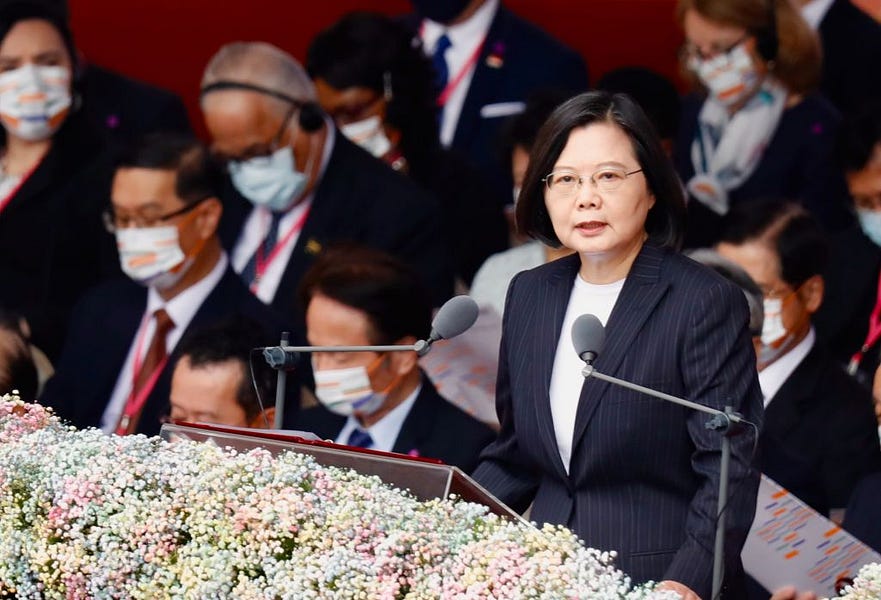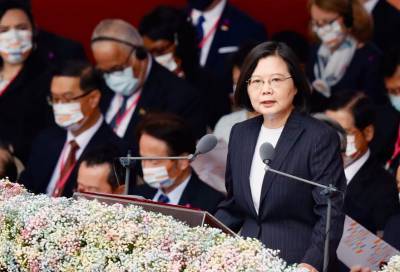This week, I want to take a close look at two China-related stories that caught my eye. First, Taiwan’s President, Tsai Ing-wen, stood up to the mainland’s Chinese Communist Party (CCP) in a remarkable speech. Tsai was responding to the latest provocations from Xi Jinping, the Chinese ruler who has his eyes set on her tiny island nation.
Second, the Islamic State conducted a suicide bombing at a Shiite mosque in Afghanistan’s Kunduz province. Although this sort of attack is commonplace, it was intended to send a message not only to the Taliban, but also China. Let’s examine both stories.
Xi claims history is on his side.
On October 9, Xi delivered an ominous speech regarding the “Taiwan question.” Xi’s remarks were intended to commemorate the 110th anniversary of the Revolution of 1911 (or Xinhai Revolution), which overthrew the imperial Qing dynasty. While Xi reiterated his alleged desire for a “peaceful reunification,” a seemingly benign outcome, his address was clearly dark and menacing.
Xi began by placing the “Taiwan question” in historical context, claiming it “arose out of the weakness and chaos of our nation and it will be resolved as national rejuvenation becomes a reality.” This is a reference to China’s fractured past. The CCP regularly uses historical grievances—both real and imagined—to justify its hold on power. Xi and other Chinese officials argue that the Chinese people, including citizens of Taiwan, can avoid the chaos of the previous, disunified era more than 100 years ago only by submitting to the party’s iron grip on power today.
After re-asserting China’s historical grievances, Xi argued that the “the general trend of Chinese history,” as well as the “common will of all Chinese people,” will necessarily lead to reunification. He then cited Dr. Sun Yat-sen, the leader of the 1911 revolution, as saying: “The tide of history is mighty. Those who follow it will prosper, while those who go against it will perish.”
In Xi’s view, the “tide of history” is on the CCP’s side, while the government of Taiwan is going “against it.” It does not require much effort to understand which party must “perish.”
After delivering this admonition, Xi then spoke of “[n]ational rejuvenation by peaceful means,” saying it was in the best “interests of the Chinese nation as a whole, including our compatriots in Taiwan.” But the Chinese ruler wasn’t finished threatening Tsai’s government in Taipei. Xi said that his compatriots “on both sides of the Taiwan Strait should stand on the right side of history and join hands to achieve China’s complete reunification and the rejuvenation of the Chinese nation.”
Xi claimed that the “Chinese nation has an honorable tradition of opposing division and safeguarding unity.” And “Taiwan independence” is the “greatest obstacle to national reunification,” as well as “a grave danger to national rejuvenation.”
Then, Xi issued a clear threat: “Those who forget their heritage, betray their motherland, and seek to split the country will come to no good end, they will be disdained by the people and condemned by history.” The audience erupted in applause as Xi spoke those words.
Xi said the “Taiwan question is purely an internal matter for China, one which brooks no outside interference,” and that no one “should underestimate the resolve, the will, and the ability of the Chinese people to defend our national sovereignty and territorial integrity.” More applause followed.
“The complete reunification of our country will be and can be realized,” Xi vowed.
Tsai Ing-wen echoes President Biden, while standing up to Xi Jinping.
Taiwan’s president, Tsai Ing-wen, responded in a defiant speech of her own the next day, October 10. That date is significant. It is known as Double Tenth Day, which marks the anniversary of the uprising against the Qing dynasty—the same event Xi commemorated in his speech. That revolution also led to the founding of the Republic of China, Taiwan’s official name.
Tsai said her nation would not “bow to pressure” from mainland China and the two “should not be subordinate to each other”—a clear rebuke of Beijing’s intention to subsume the tiny island nation.
Tsai repeated a theme that has become the cornerstone of President Joe Biden’s foreign policy: The world is embroiled in a contest between autocracies and democracies.
“At this moment, the global political landscape is undergoing drastic change,” Tsai said. “Free and democratic countries around the world have been alerted to the expansion of authoritarianism, with Taiwan standing on democracy's first line of defense.”
She praised other democracies for supporting Taiwan throughout the COVID-19 pandemic, specifically thanking Japan, the United States, Lithuania, Slovakia, the Czech Republic, and Poland. All of these countries, with the exception of Lithuania, now have a diplomatic presence inside Taiwan. And Lithuania “will soon establish a representative office” inside the country. Tsai explained that this is “an embodiment” of “this year’s theme”: "Broadening Democratic Alliances and Making International Friendships.”
“In Washington, Tokyo, Canberra, and Brussels, Taiwan is no longer on the margins, with more and more democratic friends willing to stand up for us,” Tsai said. As a result, her country “is no longer seen as the orphan of Asia, but as an Island of Resilience that can face challenges with courage.”
But President Tsai knows full well that the CCP seeks to end Taiwan’s success story. The “more we achieve, the greater the pressure we face from China,” Tsai warned. “So I want to remind all my fellow citizens that we do not have the privilege of letting down our guard.”
Tsai reminded her audience that the CCP’s goons have taken “complete control of Hong Kong,” while “suppressing … democracy activists” there. She also mentioned that the CCP was challenging the “regional order” in the “South and East China Seas.”
Earlier this month, Beijing launched its largest incursion into Taiwan’s Air Defense Identification Zone (ADIZ) to-date, sending approximately 150 military aircraft into the area off the island nation’s coast. This activity “has seriously affected both our national security and aviation safety,” Tsai said.
In “contrast” to these unprovoked provocations, “democratic countries are working to strengthen our broad-based, mutual cooperation in order to respond to regional and global developments.” She pointed to alliances and partnerships such as the “G7, NATO, EU, and QUAD,” all of which “highlighted the importance of peace and security in the Taiwan Strait, while expressing concern over whether China may unilaterally undermine the status quo of peace and stability in the Indo-Pacific region.”
It's clear that Tsai is hoping that these same actors will rise to Taiwan’s defense, should Xi decide that “peaceful reunification” is no longer an option.
Tsai reiterated her own nation’s commitment “to the peaceful development of the region” and called “for maintaining the status quo.”
Only time will tell how long this “status quo” will last, or how far the U.S. and its allies are willing to go in defense of Taiwan. It may be the case that historians will look back on the speeches delivered by Xi and Tsai this month as key landmarks in this story.
A suicide bombing in Kunduz.
On October 8, a suicide bomber blew himself up at a Shiite mosque frequented by members of the Hazara community in Afghanistan’s northern Kunduz province. The Islamic State-Khorasan Province (ISIS-K) quickly claimed responsibility for the heinous attack, which killed or wounded approximately 100 civilians.
The Islamic State is well known for such bombings. The Sunni jihadist group has a fetish for spilling Shiite blood and regularly dispatches its “martyrs” to locales frequented by the Muslim minority. Indeed, in one of its messages after the bombing, the Islamic State reiterated its intent to continue exporting its hatred for Shiites from Baghdad to the Khorasan (meaning Afghanistan and Pakistan).
But ISIS-K had another purpose for the bombing. The Islamic State’s Amaq News Agency identified the terrorist responsible as a Uyghur Muslim, claiming that the Taliban “had pledged to expel” Uyghur Muslims from Afghanistan “in response to China's demands and policies against Muslims” in the Xinjiang region.
I covered much of the backstory in a previous edition of Vital Interests. The short version is that the Turkistan Islamic Party (TIP), an al-Qaeda-affiliated group, waged jihad on behalf of the Taliban to resurrect its Islamic Emirate of Afghanistan. The TIP is predominantly composed of Uyghur Muslims, many of whom are from Xinjiang. The Islamic State has its own contingent of Uyghur jihadists, and has tried to poach from the TIP since 2014, when the would-be caliphate began to openly challenge the Taliban’s authority inside Afghanistan. To date, the TIP has remained loyal to al-Qaeda and the Taliban, but some Uyghur jihadists have signed up for the former caliphate’s cause.
Therefore, the Islamic State’s suicide bombing in Kunduz was intended to send a message not only to Shiites, but also to China, the Taliban, and Uyghur jihadists.
The Islamic State’s message to China is straightforward: We have Uyghur suicide bombers willing to kill on our command.
The Islamic State’s message to the Taliban: If you think you can cut a deal with China, trading security guarantees for economic incentives, then think again. The Islamic State will find ways to disrupt any such arrangements and embarrass the Taliban.
And the Islamic State’s message to Uyghur jihadists: If you feel betrayed by the Taliban, then join us, we aren’t going to rein you in.
China has demonstrated a willingness to do business with the Taliban. And the Islamic State has every incentive to disrupt their dealings.






Please note that we at The Dispatch hold ourselves, our work, and our commenters to a higher standard than other places on the internet. We welcome comments that foster genuine debate or discussion—including comments critical of us or our work—but responses that include ad hominem attacks on fellow Dispatch members or are intended to stoke fear and anger may be moderated.
With your membership, you only have the ability to comment on The Morning Dispatch articles. Consider upgrading to join the conversation everywhere.